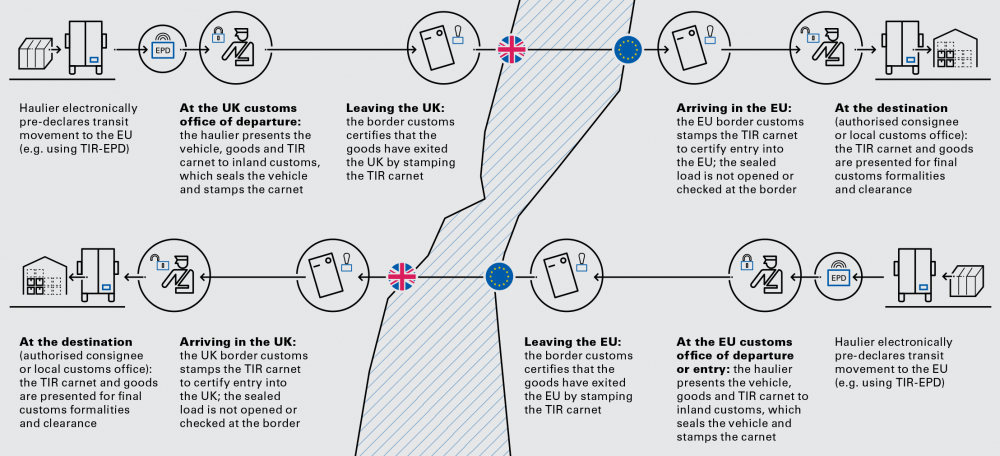TIR: a secure transit solution for UK-EU transports
TIR can now be used by firms to transport goods to and from the UK. Accredited TIR hauliers in the EU, UK and beyond can use this tried and proven system to easily complete customs procedures.
Why use TIR?
- Cost effective: multiple consignments are covered by one single guarantee.
- Single transit declaration: the TIR carnet is the customs declaration, so you don’t need a separate transit declaration for each consignment.
- Secure: cargo is sealed at all times, reducing risk of damage and fraud.
- Single guarantee: with coverage up to EUR 100,000 and no need to purchase an additional guarantee from other entities.
- Easy to use: complete formalities directly with customs, without needing a third party.
- Simplified digital transit pre-declaration: you easily can do it yourself with no need for a broker and you only need a transit declaration for the EU, not the UK.
How it works

Get started today
For more information on TIR, please contact us.
Contact us
Brexit and the international road transport sector
The decision by the United Kingdom to leave the European Union has had many implications for international road transport. Even though a trade deal was negotiated in late 2020, days before the UK’s transition period ended and already entered into force on 1 January 2021, legal and operational questions remain that need further clarification, and transport operators have concerns on using new processes and systems to move goods and people across the EU-UK border.
The industry needs clarity and certainty to plan and run their transport businesses. More broadly, international supply chains and mobility networks need to keep running smoothly to avoid damaging trade, jobs and economic growth, especially in light of the pandemic.
Issues that the road transport industry is monitoring
- Customs procedures, infrastructure and border issues – the TIR system is now a crucial tool for operators moving goods into and out of the UK, and customs agents and brokers on both sides of the border need to be trained in order to facilitate its use. Secure parking, customs clearance and sanitary and phytosanitary facilities are also needed to ensure goods keep moving.
- Passenger transport – new protocols on advance passenger data exchange for coach transport are also important.
- Access to the road transport profession – training of managers and drivers, mutual recognition of qualifications.
- Access to the road transport market – who can drive where, when and for how long, including the interpretation and implementation of the cabotage provisions of the EU-UK trade deal.
- Social conditions and access to the labour market – driving and rest time rules, and minimum wage rules, especially given the large number of EU nationals employed by UK road transport firms, and that driver shortage remains a pan-European issue.
- Traffic rules and enforcement – collecting traffic and driving fines.
- Transport documents and mutual recognition – acceptance of licences and other paper and digital documents related to goods or passenger movements.
- Vehicle standards, including emissions and weights and dimensions – how will current EU rules continue to apply in the UK, or for UK trucks and coaches in the EU, over time.
Brexit
TIR: a secure transit solution for UK-EU transports
TIR can now be used by firms to transport goods to and from the UK. Accredited TIR hauliers in the EU, UK and beyond can use this tried and proven system to easily complete customs procedures.
Why use TIR?
How it works
Get started today
For more information on TIR, please contact us.
Contact us
Brexit and the international road transport sector
The decision by the United Kingdom to leave the European Union has had many implications for international road transport. Even though a trade deal was negotiated in late 2020, days before the UK’s transition period ended and already entered into force on 1 January 2021, legal and operational questions remain that need further clarification, and transport operators have concerns on using new processes and systems to move goods and people across the EU-UK border.
The industry needs clarity and certainty to plan and run their transport businesses. More broadly, international supply chains and mobility networks need to keep running smoothly to avoid damaging trade, jobs and economic growth, especially in light of the pandemic.
Issues that the road transport industry is monitoring
Related links
TIR flyer
IRU's positions on Brexit
Related news
Geneva
European road freight rates converge
Geneva
European road freight rates fall in Q1 2025
Issy-les-Moulineaux
Global parcel delivery company Geopost joins IRU
Amsterdam
The European Transport Board joins IRU to strengthen industry collaboration
Geneva
Europe road freight rates Q3: Contract rates flat as spot rates fall
Geneva
Austria becomes latest country to go paperless with e-CMR
Geneva
Three key trends defining European road freight rates: Q2 to Q4 2024
Geneva
Global challenges facing the trucking industry
Brussels
From long-haul to last mile: IRU and POLIS tackle zero-emission logistics
Brussels
Interoperability: IRU outlines road-rail digitalisation synergies